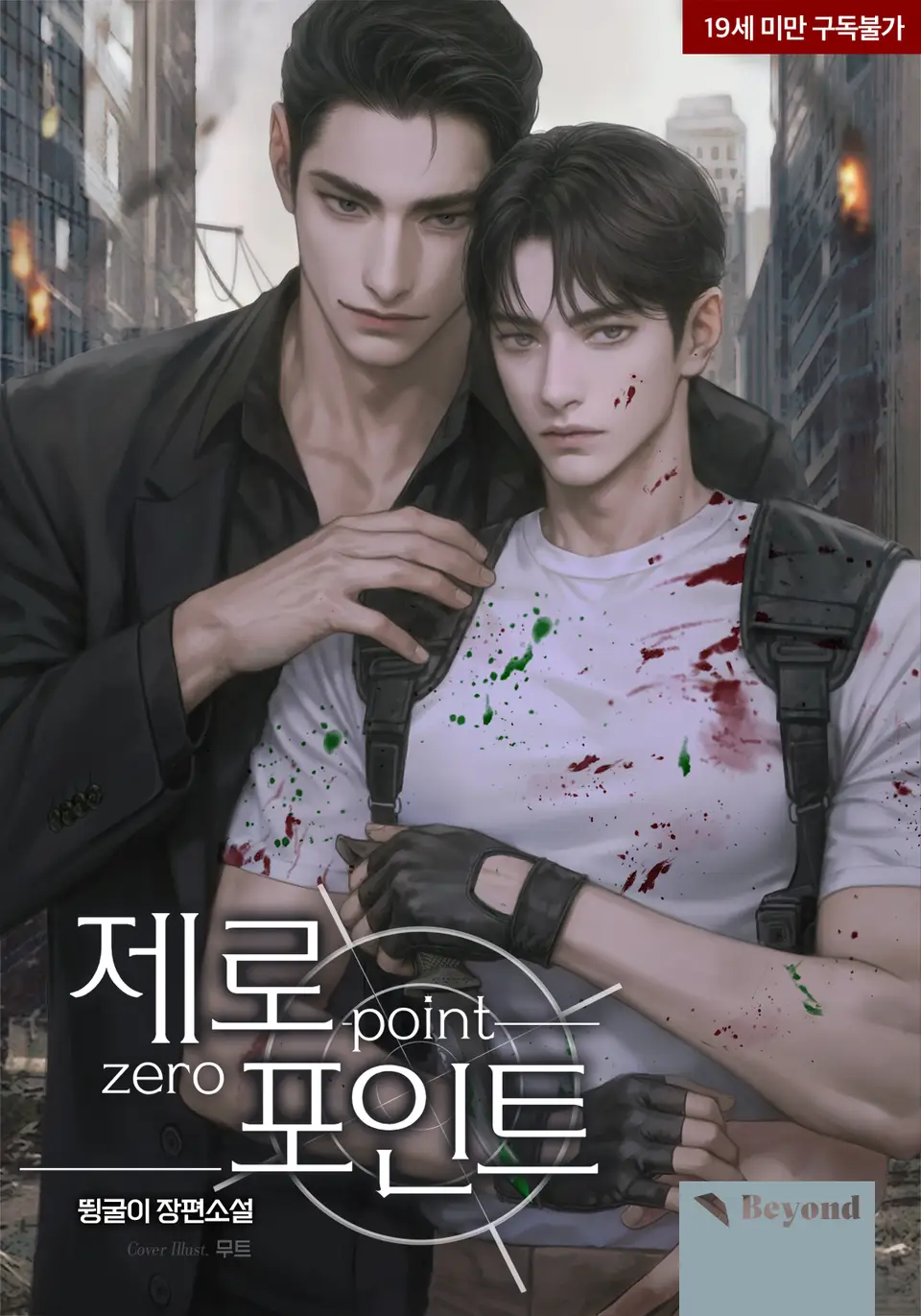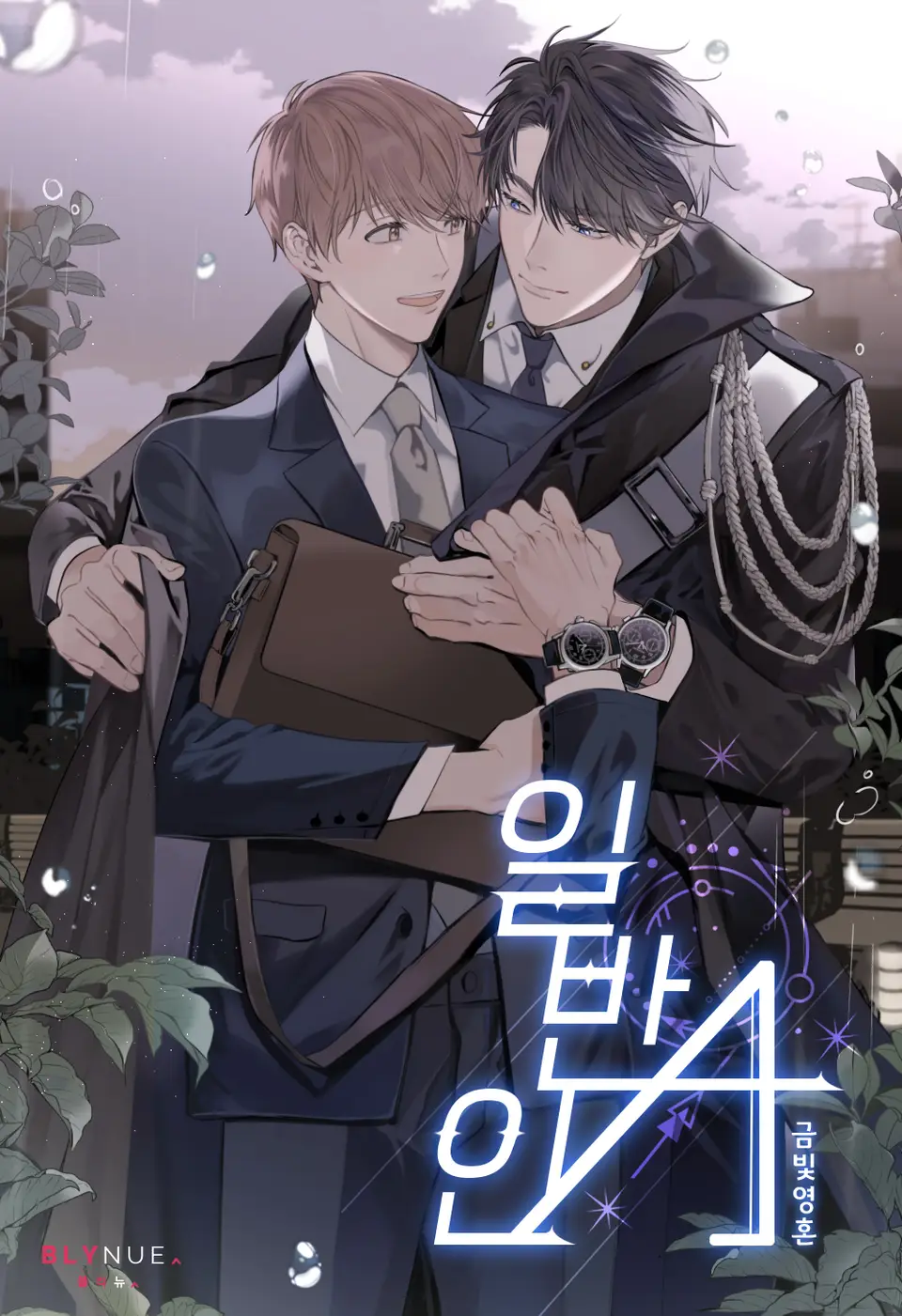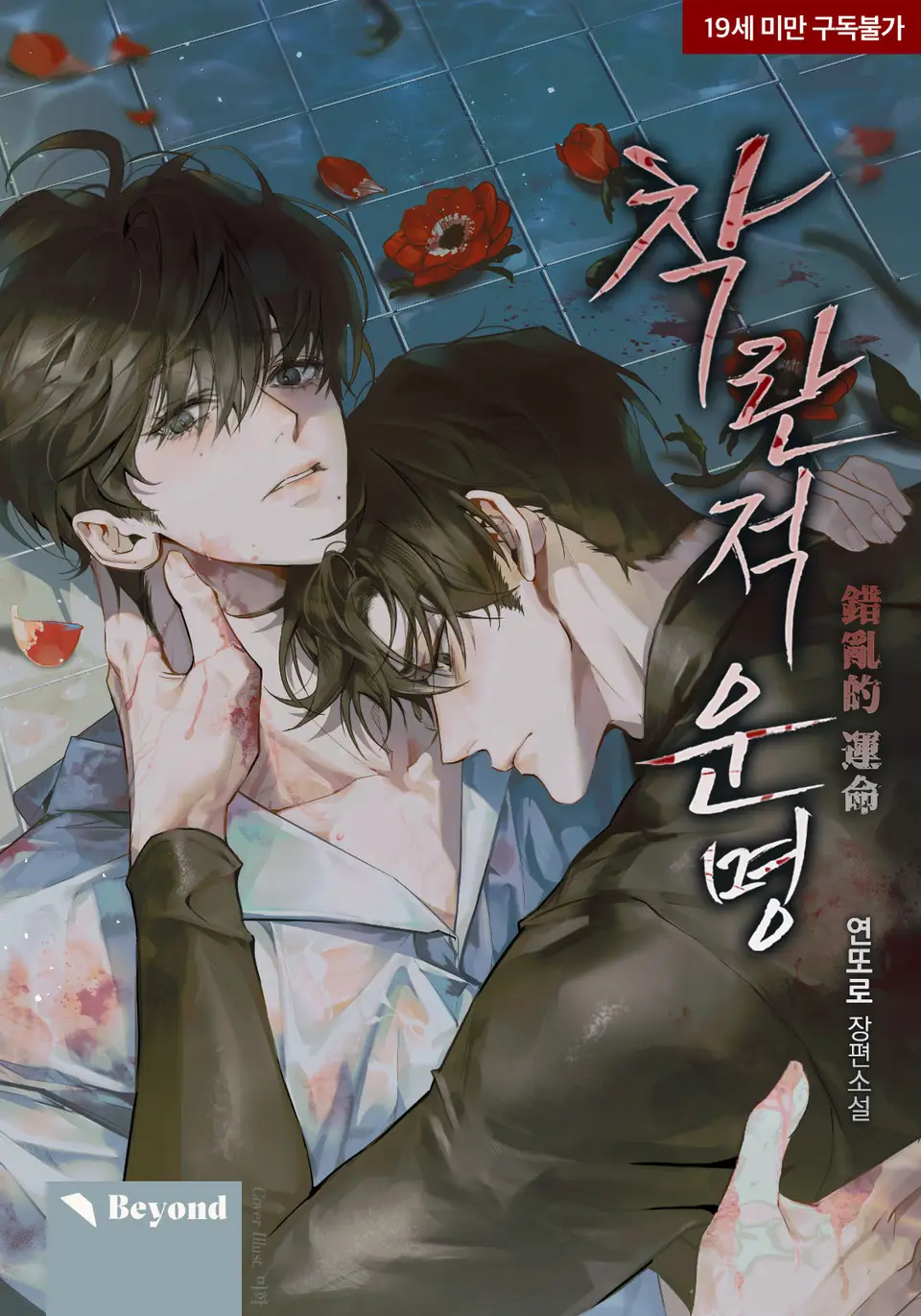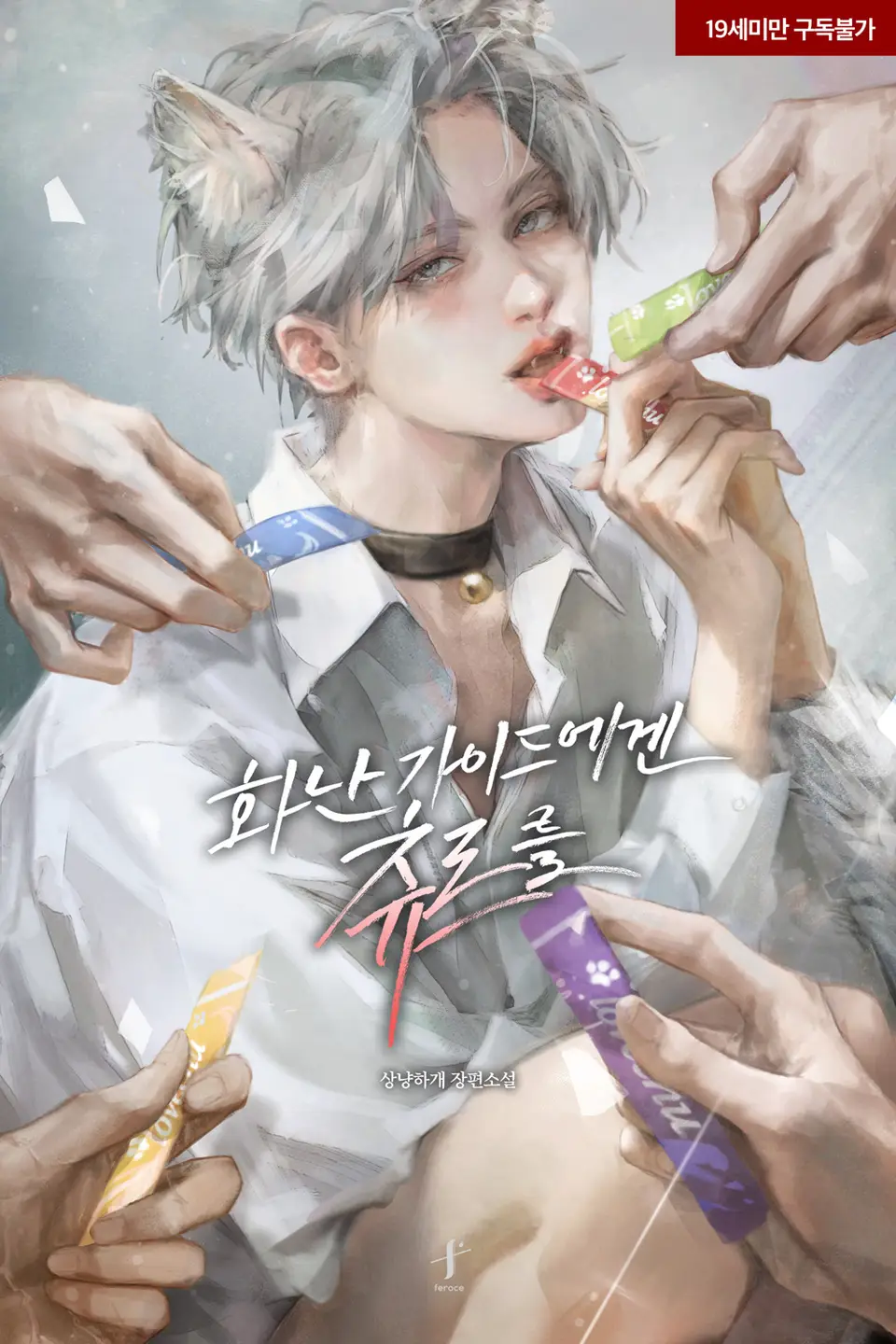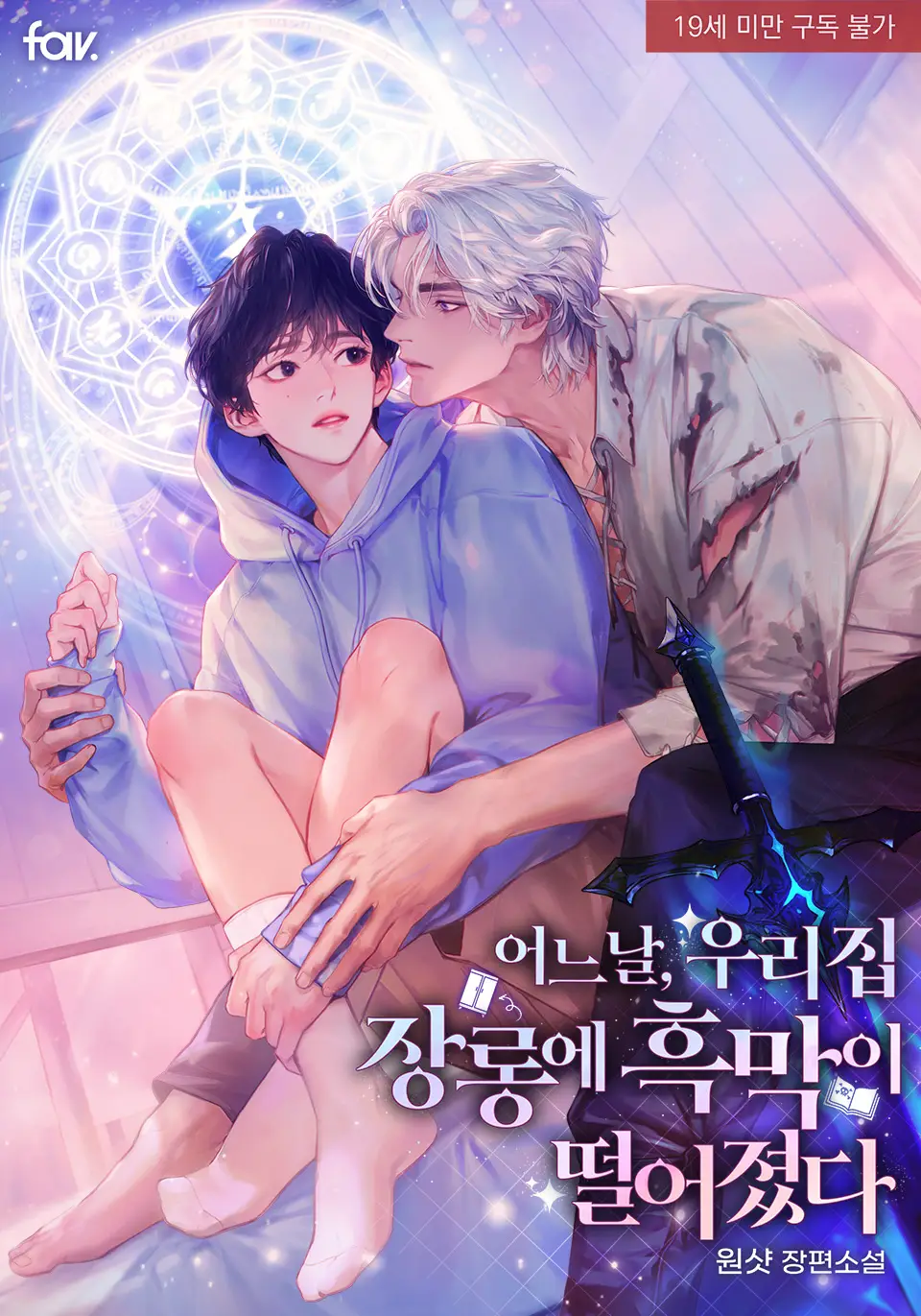A haze of steam billowed up into the air. The space was thick with it, and beads of condensation clung to the white walls like scattered teardrops.
Above the stark white bathtub, water swirled red, sloshing as if it might spill over at any moment. Within the tub, a man lay submerged in silence. His head tilted back, eyes locked on the void above, the dwindling flame of life in his gaze quietly flickered and dimmed.
Like a candle trembling against a violent gust, his weakened pupils wavered, and his soft features curved into a gentle arc. Perhaps it was the tears pooling at the corners of his reddened eyes, but despite the faint smile on his lips, the man’s face looked endlessly sorrowful.
“Somewhere… over the rainbow…”
Plink. Plop.
In a space where the only sound had been the occasional drop of water falling, a sorrowful song now rose, filling the silence. The delicate voice was frayed and cracked at the edges, revealing a lifetime that had been anything but kind. It was laced with raw tenderness, the kind that bled from wounds never healed.
The man who lay limply in the tub, Nabin, knew—his end was near.
Most people feared death. Because no one truly knows what lies beyond it. Whether this life continues in some form, whether another life waits on the other side, or whether death is simply the end—erasing even one’s existence—no one can say for certain.
But Nabin found peace in the knowledge that he could die. Even as the blood that sustained him mingled with water and left his body, taking his life with it, he felt only comfort.
If he had known death would feel like this, he would have stepped toward it long ago. A wave of regret suddenly surged—why had he forced himself to trudge through such a painful life? But then, as his heavy eyelids slowly fluttered closed, his thoughts shifted.
He should be thankful he could close his eyes in peace, even now.
Like a snowflake drifting through the air, unable to find a place to land, and finally throwing itself upon the frozen earth—life, too, was fleeting and fragile. And even if it ended just like that, Nabin had resolved not to regret it.
He had lived every moment with fierce intensity. Even if others scorned his life as dirty or pathetic, Nabin had endured and endured, suppressing the urge to end it all. And now, though he had chosen to abandon his own life in the end…
If he had one small wish, it was to remain in the memories that surfaced now, forever looping through them after his eyes closed.
Through the dense steam, the white walls once blank and hollow now brimmed with a scene from his childhood.
On a sun-drenched path, where the sunlight shattered brilliantly around him, he sang cheerfully, sending bursts of laughter fluttering along the breeze.
Back when warm hands held his, Nabin had been happier than anyone else in the world. So long as he held onto those big, strong hands, he felt like he could smile and overcome anything that came his way.
And yet, it was Nabin who made those hands vanish from this world. That was why he could blame no one else. He accepted the suffering that followed as a kind of penance, enduring it without complaint.
But now… he had reached his limit. He no longer had the strength to keep breathing.
Like the fading notes of a distant song, Nabin wanted to be buried in the vast expanse of his memories.
Bang!!
Just as the faint remnants of his song wavered in the air, a loud crash tore through the space like an uninvited intruder.
“Kim Nabin! Open the door!”
“……”
The mournful melody cut off abruptly with the explosive sound.
Eyes so empty they seemed to stretch endlessly turned weakly toward the tightly shut bathroom door. It groaned and trembled, as though it might shatter at any moment from the pounding it endured.
How many times had it been struck already?
At last, the door that separated Nabin from the world splintered apart with a loud crack.
Through the mist thick as fog, their eyes met.
Nabin, looking at the people staring back at him in shock, felt a flicker of confusion.
‘Why are they looking at me like that…?’ They were never anything to him, nor he to them.
“You… what the hell are you doing…?”
Beyond the broken doorframe stood several people, each striking in appearance. They froze on the threshold, as if bound in place by invisible cords.
Nabin let that fleeting question drift away, meaningless. Everything felt pointless now. He slowly drew his gaze away from the faces staring at him in disbelief.
His chest rose and fell—slower now, fainter. His breath hovered at the tip of his nose, on the verge of slipping away completely.
He didn’t want to close his eyes in pain while looking at them. His life had been full of nothing but suffering, so he wished, at least, for a peaceful death.
On Nabin’s retina, the ceiling above came into view, dotted with water droplets like flower buds.
One droplet, swollen and heavy with steam, began its final descent.
It slid down, tracing a line over Nabin’s unmoving face—like it was crying in his stead, for he no longer could.
***
“Kim Nabin! Where are you? You’d better come out right now!”
At the thunderous roar that shook the house, Nabin crawled into the gap under the bed, his small body barely squeezing in. His frail frame trembled every time that slurred, drunken voice bellowed through the air.
He clamped a tiny hand over his mouth, terrified that even the sound of his breathing might give him away. Hic… hic… The sobs that slipped out felt too loud. He tried to stop, but once the tears burst free, they refused to dry up so easily.
Heavy footsteps drew close—then retreated—then came again. Each crash of something breaking under the man’s rage pierced Nabin’s ears like a scream, and he choked back his whimpers.
“Kim Nabin! I told you to come out while I’m still being nice!”
Bang!
When his frantic search throughout the tiny house turned up nothing, the man stormed into the last untouched room—a cramped space barely big enough for a single bed and a heap of clutter.
The door flung open with a violent creak, and Nabin’s delicate body flinched beneath the dust-caked bed.
“You’re in here, aren’t you?”
As the man tore through the room, Nabin kept his eyes squeezed shut. The sound of blankets being yanked away, closet doors ripped open—everything tangled together in his ears like a chaotic knot.
The man’s ragged breathing grew louder, closer. Nabin’s tiny heart pounded so fiercely it felt like it might burst through his chest. He curled up tighter. The thick dust beneath the bed tickled his nose.
“C-Cough… Hic… N-No… cough cough…”
He tried with all his might to muffle the cough in his palm, but it wouldn’t stop. His pale face flushed red from the strain, coughing uncontrollably now. As fear took hold—fear of being found—big, round tears spilled down his cheeks.
But something felt… off.
By now, the man should have found him—should’ve been screaming, shouting, yanking him out. But there was only silence.
The man’s voice, once raging and constant, had cut off unnaturally. Now, only Nabin’s shallow, choked coughs echoed through the air.
Slowly, Nabin opened his eyes.
And in that instant, through the small crack beneath the bed, his gaze locked with a bloodshot eye pressed against the floor.
Instinctively, he tried to crawl deeper inside.
But it was too late. The man’s hand clamped around his ankle and yanked him out from under the bed.
The boy was small—barely a fraction of the man’s size. Yet the man showed no hesitation.
“I-I’m sorry… Please… A-Appa… Nabin is sorry…”
Thrown to the ground with nothing to protect him, Nabin dropped to his knees, clasping his hands together as he looked up, pleading.
His thin body, clad in nothing but a threadbare t-shirt, bore countless marks of cruelty. Old bruises, yellowing and purple, blotched his emaciated frame, each wound a silent testament to the violence.
On his bony chest, more bruises began to bloom—fresh red over fading blue.
“I told you—you should’ve come out when I said it nicely!”
The man was no better than a beast wearing human skin. His eyes gleamed with rage, pupils unfocused, like a predator lost to its instincts.
With every word, his fists fell. Nabin’s tiny body jerked with each blow.
He couldn’t fight back. All he could do was curl up, wrapping his skinny arms around his head in a desperate attempt to shield himself.
The sobs quieted. His breathing grew shallow, his body limp like a rag doll.
Only when Nabin lost consciousness did the man finally leave the room.
The boy left behind, crumpled on the floor of that shabby room, looked like a wildflower crushed under careless feet—uprooted and discarded.
“Ugh… hngh… it hurts… Mommy…”
For a while, he could only let out soft, broken breaths. Then, sobbing, he called for his mother.
The words, barely escaping his swollen, bloodied lips, sounded like they might vanish at any moment.
It was the dead of winter.
The cold floor, untouched by heat, was lethal for the fever burning inside his small body.
His puffy cheeks had turned a deep cherry red. Every breath became a puff of white, vanishing into the freezing air.
Instinct drove him to survive.
Shaking uncontrollably, Nabin crawled across the floor to the side of the bed. Atop it sat an old but thick blanket, crumpled into a corner.
He couldn’t lift it. Just pulling it down soaked his thin shirt in cold sweat. With the damp clothes clinging to his fevered skin, even his lips turned a purplish hue.
Like a snail burrowing into a cracked shell—the only sanctuary it had left—Nabin curled up inside the blanket.
His heavy eyelids fluttered. There was no strength left in his gaze.
The man who had beaten him wasn’t Nabin’s real father.
Nabin’s father had died six months ago—killed by a monster that appeared in the city while trying to save Nabin.
The loss hadn’t just devastated young Nabin. It had shattered his mother as well.
After that day, she lost her grip on reality.
She drowned her grief in alcohol and strange men.
At an age when he should have still been wrapped in his mother’s arms, Nabin was left utterly defenseless, forced to protect himself far too soon.
The man hadn’t been violent from the start.
When he first moved in, introduced as the one who’d be living with them from now on, he’d treated Nabin with fake affection, as if he really were his own son.
“Nabin, from now on, I’m your dad. You can call me Appa.”
He’d smiled warmly, like someone genuinely kind.
Nabin, still numb with grief and neglected by his mother, opened his heart quickly.
For a brief moment, it had seemed like his wounds were healing.
But that illusion didn’t last long.
Whenever the man drank, he became someone else.
The carefree, chuckling figure turned into a monster—violent, unpredictable.
And even as bruises marked Nabin’s fragile body, his mother stayed silent.
There was no way a child like Nabin could defend himself against a grown man’s fury.
The one person who should’ve stood between them turned a blind eye.
All Nabin could do was hide whenever the man came home drunk.
On lucky days, the blows didn’t come.
Today wasn’t one of them.
Dust triggered his cough. That one slip gave him away.
The kicks had left his chest sore and tight. Breathing itself became painful, every inhale slicing through him like glass.
Even as he cried out for his mother like a drowning child, only the drunken snores of his stepfather echoed in return.
It was a small house. Surely his mother had heard the sound of his beating.
But the thin door between them never opened.
Tears welled up in his large eyes.
He missed his father.
When Dad had still been alive, his mother hadn’t been affectionate—but she had at least held him sometimes, pressing kisses to his chubby cheeks.
Nabin was only five years old.
Even at such a tender age, he believed it was his fault that his mother had changed. He thought his father had died because of him. He couldn’t shake the thought that his mother must hate him—because it was Nabin who had caused his father’s death.
Rather than hating the mother who abandoned him to such cruelty, he blamed himself.
As his fading consciousness dimmed and flickered, the memory of that day surfaced, hazy but persistent.
They had gone out together to meet his mother, who was working late. He’d held his father’s hand as they walked down the street, and for no particular reason, a smile kept playing on his lips.
His father was Nabin’s favorite person in the world. Every second he spent with him was happiness itself.
The world Nabin lived in had changed in the 21st century.
Dungeons had appeared.
The monsters that crawled out of them couldn’t be defeated with modern firearms. Humanity was on the brink of collapse—until people with powers emerged.
Espers who could slay monsters, and Guides who stabilized the chaotic waves of energy Espers emitted whenever they used their powers.
The world began to revolve around Espers and Guides.
D-rank was barely different from an ordinary human, but from C-rank onward, these individuals were treated with privilege wherever they went.
Both of Nabin’s parents were B-rank ability users.
His mother was a B-rank elemental Esper with the power of ice, and his father was a B-rank Guide.
They both worked for the K Ability Center and were eventually paired together.
It was rare for an Esper and a Guide to form a one-on-one Pair.
Usually, Guides were assigned temporarily based on compatibility rates. An Esper would receive guidance from different Guides at the Center when needed, rather than forming a permanent contract.
Forming a Pair meant the Guide would exclusively provide physical contact guidance to that one Esper.
The Center only allowed such a contract if the matching rate was over 80%—an infrequent occurrence.
Nabin’s parents had a compatibility rate of 88%. It was exceptionally high. Since both were B-rank, the Center approved their pairing.
A Guide’s role was to stabilize an Esper’s unstable magical energy waves. They didn’t differ much from ordinary people in terms of physical or combat abilities.
Of course, those who awakened as Guides were registered with the Center and trained accordingly.
They learned to handle Guide-exclusive weapons and received combat training, but it was still difficult for them to handle monsters the way Espers could.
However, highly trained Guides—or those with extensive field experience fighting monsters alongside Espers—excelled in crisis management.
While they lacked the raw power to slay monsters, they had a higher survival rate in direct encounters.
Nabin’s father had been a veteran Guide.
After Nabin’s birth, he took on the role of primary caregiver, which meant fewer assignments to dungeons. But he still carried the experience of countless missions.
For someone like that to lose his life—it could only be described as a series of tragic coincidences culminating in a disastrous stroke of misfortune.

